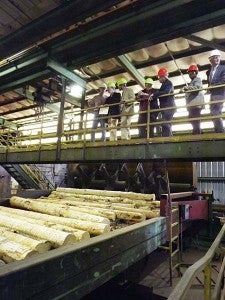Ag secretary gets tour of Franklin Lumber
Published 10:45 am Wednesday, March 19, 2014

Terry Godwin, center, begins a tour of Franklin Lumber. With him are Stephen Versen, project manager for Agriculture and Forestry Development Services, and Todd Haymore, Virginia secretary of agriculture and forestry. In the foreground are Robert Jefferson, an Isle of Wight County supervisor, and Beverly Walkup, director of Planning and Zoning for the county. — STEPHEN H. COWLES | TIDEWATER NEWS
FRANKLIN—Todd Haymore, Virginia secretary of agriculture and forestry, got another close look at a local industry last week: Franklin Lumber.

Godwin points how the logs on a conveyer belt coming from the sharp chain, which can cut 400 logs an hour. — STEPHEN H. COWLES | TIDEWATER NEWS
The tour followed his viewing of Montague Farms in Windsor, which came after Gov. Terry McAuliffe’s announcement of a $14,100 grant from Agriculture and Forestry Industries Development.
Terry Godwin, procurement manager and co-owner with Perk Taylor, guided Haymore along with Stephen Versen, project manager for AFID. With them were Delores “Dee Dee” Darden, Al Casteen, Rex Alphin and Rudolph Jefferson, Isle of Wight County supervisors, as well Beverly Walkup, director of Planning and Zoning, and Anne Seward, county administrator.
Last June, Godwin and Taylor – both former IP Sawmill employees – worked with International Paper to purchase the mill, which closed in 2009. This was the time of the country’s recession. A lack of demand, said Godwin, caused so many sawmills to close.
Franklin Lumber received a $150,000 matching grant from then Gov. Bob McDonnell’s AFID Fund to help the county with the project. Production began in Nov. 19.
Some of the tour highlights included the carriage machine, which Godwin said cuts a higher quality of lumber.
The sharp chain can produce a higher level of logs – about 400 per hour, and produce up to 40 truckloads a day.
Darden asked if the lumber produced at the mill goes to places such as Lowe’s or Home Depot.
“They probably will end up there, but we don’t do direct sales,” said Godwin. “We sell to treaters, which is our biggest market.”
This region is the northernmost range for southern pine, and transportation costs – diesel fuel is at $3.75 per gallon – will more likely encourage buyers to purchase here to save on transportation costs.
Computers aid in getting as much quality lumber as possible, he said.
Another factor that’s contributing to the mill’s production is the returning laborers from before the place closed five years ago.
“We were fortunate to get back a lot of people back – about one half,” Godwin said.
The 50-hour weekly production goes from 6 a.m. to 4:30 p.m. Monday through Thursday, with a half-day on Friday followed by cleanup.
“We may go to a second shift if the log market justifies it,” he said.
After the tour, Haymore was asked by The Tidewater News if Franklin Pellets could become a reality in the near future. The project was one that McAuliffe championed several years ago.
Haymore said he did not know the status of Franklin Pellets, but added that as the economy rebounds – with improvements in the economy, including forestry, there it could “certainly open more opportunities for Franklin Pellets.”





